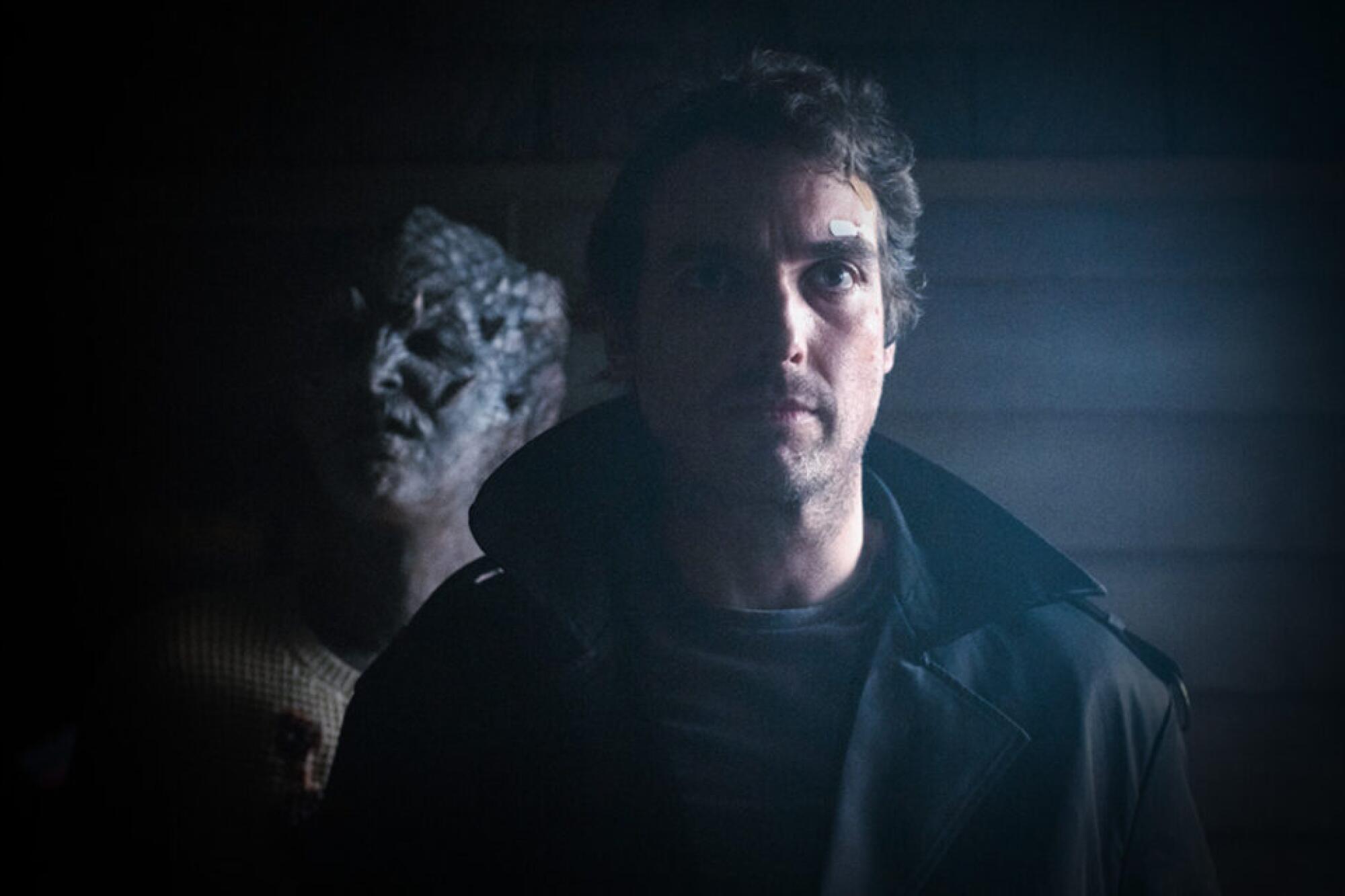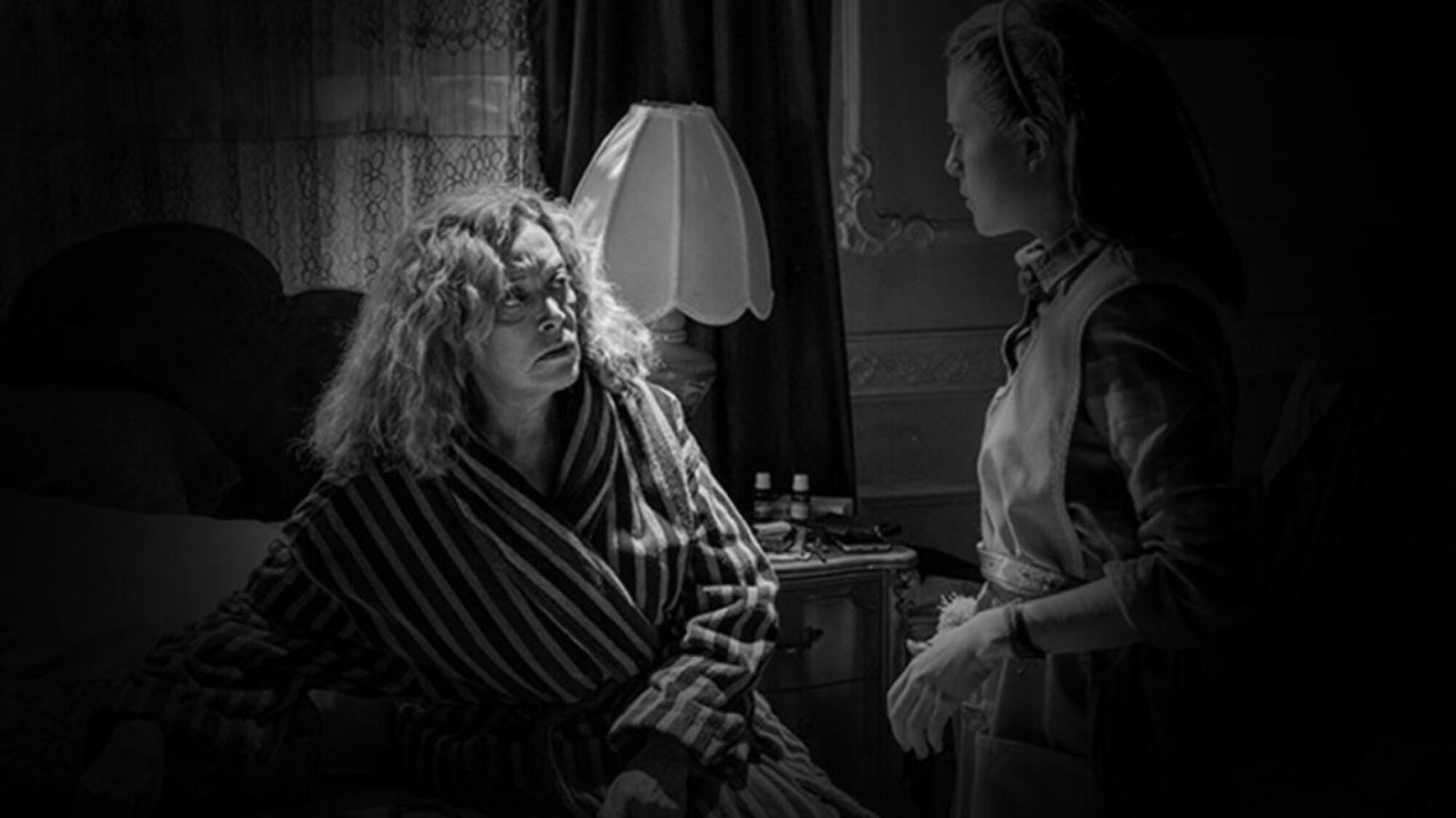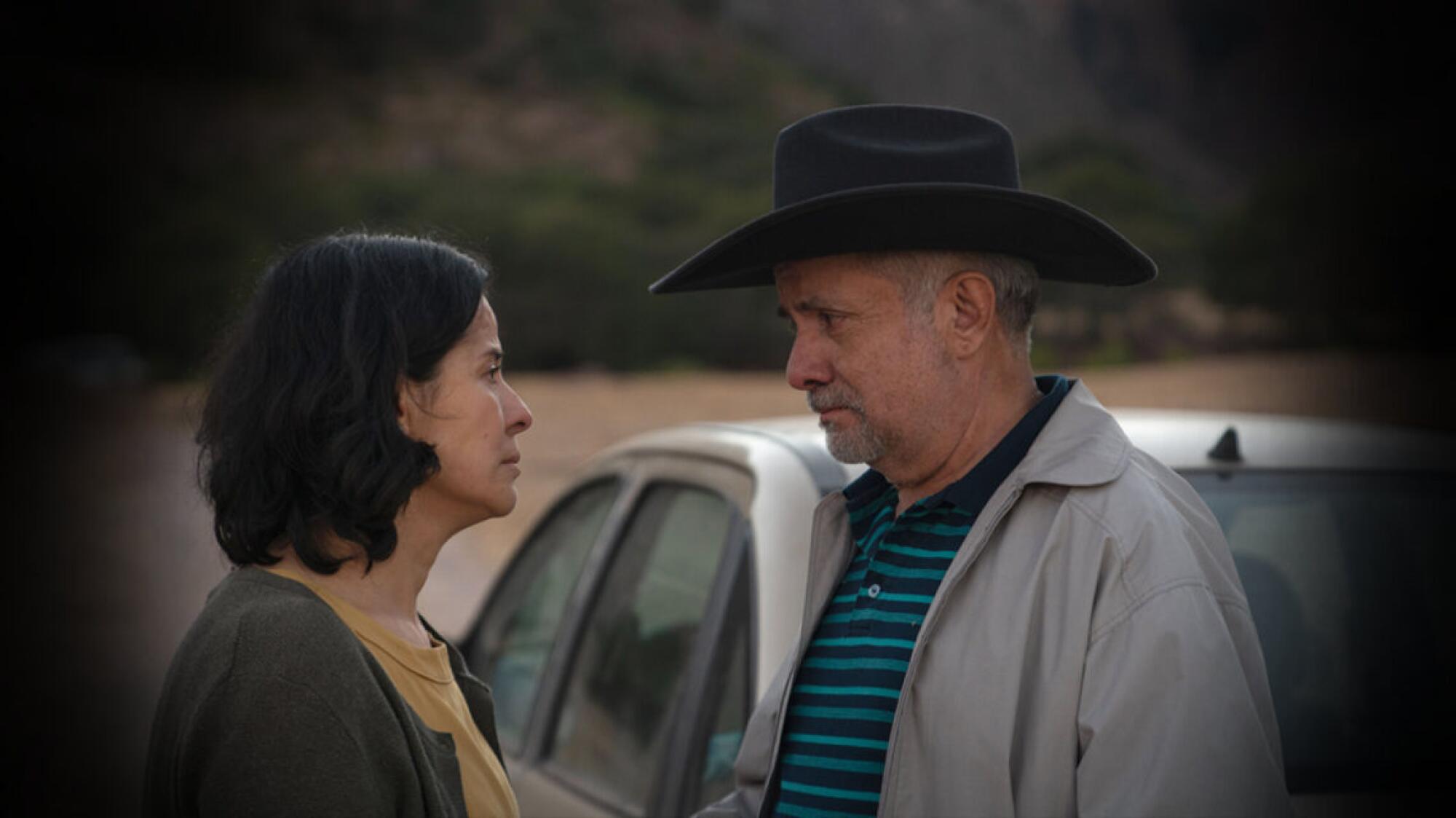
- Share via
Between Oct. 2 and 10 — and, once again, in person — the Hola México Film Festival returns to Los Angeles. The event prides itself on being the largest outside Aztec lands dedicated exclusively to the cinema of the United States’ southern neighbor.
This 14th edition of the festival will present an official program of feature films, either Mexican productions or co-productions subtitled in English. That focus on one country’s output distinguishes Hola from the Los Angeles Latino Film Festival (LALIFF) and the El GuadaLAjara Film Festival (GLAFF).
But though all the offerings in Hola México originate from the same country, festival founder and director Samuel Douek offers a lineup that is widely varied in terms of themes, genres and the genders and worldviews of the filmmakers. Douek’s choice for his festival’s Sunday opening, “Lecciones para canallas” (whose English translation is “Lessons for Scoundrels”) illustrates that mission.
The comedy arouses interest due to the starring role it gives to Joaquín Cosío, who, in addition to being widely known for performances in popular Mexican films such as “Matando Cabos” and “El Infierno,” has become familiar to U.S. audiences for his roles in high-profile Hollywood productions like the James Bond movie “Quantum of Solace” and “The Suicide Squad,” as well as in the acclaimed Netflix series “Narcos: México.”
‘Lecciones Para Canallas’ es la cinta de apertura del Hola México Film Festival
A persuasively naturalistic actor with a strong personality, Cosío in “Lecciones” plays Dirty Barry (an obvious nod to Clint Eastwood’s Dirty Harry), a con artist whose moral shabbiness is offset by his booming charisma. In the film he unexpectedly teams up with his daughter, Jenny (Danae Reynaud), whom he hasn’t seen since she was a child, as his would-be partner in crime.
Director and co-writer Gustavo Moheno (“Eddie Reynolds and the Steel Angels”) fashions an entertaining thriller with perverse edges that nonetheless falls short because its risk-averse screenplay fails to establish true emotional connections among the characters. Even so, the film breaks the mold of inconsequential romantic comedies that abound in Mexico today. It will be screened on Sunday as part of an opening ceremony that starts at 4:30 p.m. and includes an after-party at the Montalbán Theater.
At the opposite end of the festival’s lineup is “El diablo entre las piernas” (“Devil Between the Legs”), the most recent feature film (2019) by legendary filmmaker Arturo Ripstein, for whom a category of its own should be created. At 78, the teacher is still as irreverent as ever: Although his protagonists are an elderly couple (excellently played by Sylvia Pasquel and Alejandro Suárez), he refuses to soften his proposal — in contrast to what German director Michael Haneke did in his geriatric love fable “Amour” — showing his characters actively involved in a toxic relationship, complete with sexual situations and nude scenes.

Filming in black-and-white, as he has done occasionally throughout his career, Ripstein once again draws on a script written by his collaborator and life partner, Paz Alicia Garciadiego, in developing a sordid story spiked with black humor. Some viewers will find its relentless probing of macho sexuality and female submission uncomfortable to watch. However, in the midst of their intentional excesses, Ripstein and Garciadiego end up achieving a curious balance between the characters, sustaining performances as risky as they are impressive, and in a mise-en-scène whose virtuosity allows us to face a film that is both demanding and long (almost two and a half hours). It will screen Oct. 6 at 6 p.m. at the Montalbán Theater.
Hola México’s feature film lineup includes two dramas that portray tragedies arising from the chaos generated by drug trafficking and the war on drugs and that, in the manner of “Miss Bala” (2011), “Rosario Tijeras” (2005) and “Maria, Full of Grace” (2004), focus on female characters.
In “Manto de gemas” (“Robe of Gems”), director and screenwriter Natalia López Gallardo — a Bolivian based in Mexico for two decades who is the wife and collaborator of renowned filmmaker Carlos Reygadas — adopts a gendered perspective toward her story of three women living in a desolate rural area: wealthy housewife Isabel (Nailea Norvind); her domestic worker María (Antonia Olivares); and the police agent Roberta (Aida Roa).

Norvind, renowned among Latin audiences for her appearances in 1980s and ’90s telenovelas, has participated in several interesting independent film projects in recent years. Here, she shows histrionic skills as a mother of two children, recently separated from her husband, who suddenly becomes obsessed with the search for her worker’s missing sister.
María deals with that drama while working undercover for a group of drug traffickers, while Roberta faces the possibility that her teenage son belongs to the same criminal circle, as part of a maelstrom of crime that López Gallardo handles at times with a quite direct narrative style, but which on other occasions she renders with allegorical images and an artistic approach that is not entirely accessible.
Be that as it may, the film stands out not only for its impeccable workmanship and great performances but also for the way in which it presents the devastating consequences of the drug wars without depicting graphic violence. It will be screened Oct. 4 at 5:15 p.m. at Regal L.A. Live.
“La Civil,” by the Belgium-based Romanian writer-director Teodora Mihai, also focuses on a housewife separated from her husband. Just like Isabel, Cielo (brilliantly portrayed by Arcelia Ramírez) puts her life at risk to track the whereabouts of a missing person — her teenage daughter, who has been kidnapped by a cartel in northern Mexico.

However, unlike the character in “Robe of Gems,” who aspires to be a white savior, Cielo is a woman of modest means who takes even greater risks by closely following the criminals and becoming an informant for the army. Although her adventures eventually strain credulity, through her script — inspired by real events — Mihai manages to completely enmesh the viewer in a story that combines social drama with thriller, espionage and vigilante elements. It never flags despite its 2½-hour running time. It will be screened Oct. 7 at 6 p.m. at the Montalbán Theatre.
Finally, Hola México resumes its Nocturne section, dedicated to incursions into the fantastic, attesting to the advances in the genre within the Mexican industry. This is most clear in “Huesera,” another female-authored film, directed by Michelle Garza and written by Abia Castillo, with a female leading role that resorts to a somewhat complex and not entirely new symbolism of motherhood as a kind of curse. Though that theme evokes Hollywood films like “Rosemary’s Baby,” Garza’s film relies on a series of specific circumstances and novel twists to acquire its own identity.
Valeria (magnificently played by newcomer Natalia Solián) is a young married woman who has managed to get pregnant after several failed attempts and who initially finds herself subject to the dictates of the patriarchy reinforced by the women of her own family, in line with the scope of a Latin American machismo that is not limited to or enforced only by men.
But Valeria is slowly freeing herself from these bonds, even in terms of sexual identity. The flashbacks that show her as an adolescent punk rocker are offset by her current devotion to the Virgin of Guadalupe and her subsequent attempts to free herself of the curse that afflicts her with the help of some healers.

Despite the fact that this is her debut film, Garza has a lot to do with the excellent performance of the lead actress, and her clear mastery of cinematographic language enables her to shake up viewers without the need to resort to extravagant visual resources. The special effects, backed up by shocking sound bites, never cease to amaze. It’s being screened on Oct. 7 at 9.30 p.m. at the Montalbán Theater.
The same section includes another film that commands attention, more for the concept it takes on than for the results it achieves, although these are not negligible. “Satanic Hispanics” is one of those horror anthology films that are essentially irregular, with a narrator at the center who tells stories that are disconnected from one another thematically and are united simply by belonging to the school of fear.
The strategy lets us discover or rediscover the work of five directors who are already extremely popular among staunch horror fans and who are not all of Aztec origin: Argentines Alejandro Brugués (“Juan of the Dead”) and Demián Rugna (“Terrified”), Mexican American Mike Mendez (“Big Ass Spider!”), Cuban American Eduardo Sánchez (“The Blair Witch Project”) and Mexican Canadian Gigi Saul Guerrero (“Culture Shock”).

Each filmmaker directs one of the five episodes presented, almost always in Spanish and each displaying his or her own style. Although the alternation between the comic and the “hard” aspects of the genre mean that the whole does not flow together completely, the cultural elements that frequently infiltrate the stories give the entire film a very particular character that overcomes the obvious budget limitations. There is even more than one special-effects pleasant surprise. Wait until you see the creepy representation of La Santa Muerte, a deity that drug cartels have adopted as their patron “saint.” It will be screened Oct. 8 at 9.30 p.m. at the Montalbán Theater.
The 2022 edition of the Hola México Film Festival will include more than 20 feature films and 20 short films from the Tomorrow’s Filmmakers Today program.
More to Read
The biggest entertainment stories
Get our big stories about Hollywood, film, television, music, arts, culture and more right in your inbox as soon as they publish.
You may occasionally receive promotional content from the Los Angeles Times.












